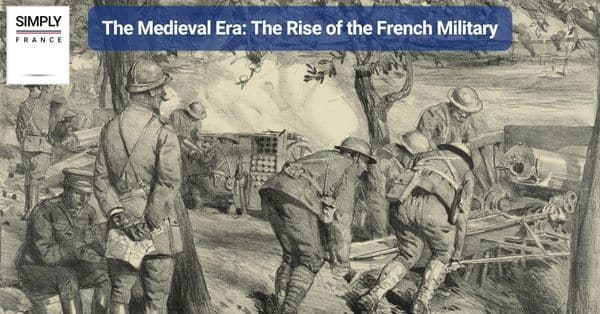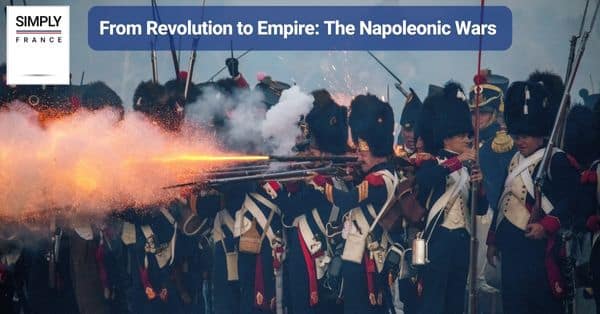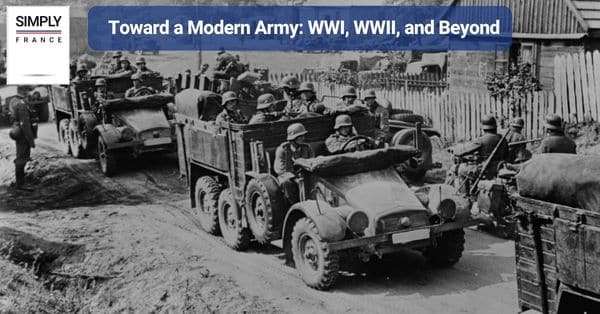The French Army’s rich history, from Medieval roots to WWI and WWII, holds a place of pride. Its role in shaping Europe and defending its people with honor and valor is remembered. The enduring legacy of the French Army’s past still influences the present, carrying on its impact through the ages.
In this blog post, we’ll take a look back at the long and illustrious history of the French Army. From its rise in power during the reign of Louis XIV to its modern-day legacy of honor and valor. We’ll explore the key moments that have transformed the French military over time, the impact it has had on France’s history, and how its spirit of courage and strength continues to live on today.
The Medieval Era: The Rise of the French Military
France has a long and storied military history, dating back to the medieval era. During this time, the French military experienced significant growth and transformation, laying the foundation for the powerful force it is today.
The Early French Military
In the early medieval period, the French military was largely made up of knights and feudal levies. Knights were heavily armored soldiers who fought on horseback, while feudal levies were peasants who were obligated to provide military service to their lord.
These early French soldiers were primarily focused on defending their own land and were not yet organized into a national army. However, as the French monarchy began to centralize power, the military began to evolve.
The Hundred Years’ War
One of the defining periods of the medieval era was the Hundred Years’ War between France and England. Lasting from 1337 to 1453, the war brought about significant changes in the French military.
Under the leadership of figures like Joan of Arc, the French military began to adopt new tactics and technologies, such as artillery and crossbows. The war also saw the rise of professional soldiers, who were paid a regular wage and trained specifically for warfare.
The Rise of the French Army
Following the Hundred Years’ War, the French monarchy continued to develop its military capabilities. King Charles VII created the first standing army in France in 1445, which consisted of roughly 15,000 men at arms.
Over the next few centuries, the French military continued to expand and modernize. In the early 17th century, Louis XIII reorganized the army into permanent regiments. This allowed for greater discipline and organization on the battlefield.
By the time of the French Revolution, the French army had become one of the most powerful in Europe, thanks to its advanced tactics and technology.

The Reign of Louis XIV and the Expansion of French Power
The Reign of Louis XIV, often referred to as the “Sun King,” was a period of immense expansion and consolidation of French power. From 1643 until his death in 1715, Louis XIV implemented a series of ambitious policies that solidified France as the dominant European power of the time.
Louis XIV’s reign saw the establishment of a centralized monarchy and the cultivation of a highly disciplined and professional French army. He prioritized the development of a strong military, investing heavily in modernizing and expanding the armed forces.
Under his rule, France experienced military successes in various conflicts, such as the War of Devolution and the War of the Spanish Succession. These victories further expanded French territories and influenced the geopolitical landscape of Europe.
Additionally, Louis XIV’s court at Versailles became the center of political power and culture. The grandeur and opulence of Versailles showcased the king’s authority and magnificence, leaving a lasting legacy in French history.

From Revolution to Empire: The Napoleonic Wars
The Napoleonic Wars were a series of conflicts fought between the years 1803 and 1815. These wars marked a significant turning point in European history as they saw the rise of Napoleon Bonaparte. Who transformed the French army into one of the most powerful military forces in the world.
Here, we will explore the history of the French army during this period, from its revolutionary beginnings to its transformation into an empire.
The Revolutionary Army
The French Revolution of 1789 was a pivotal moment in European history. It brought about significant social and political changes, including the formation of a new type of army. The revolutionary army was made up of conscripts, rather than professional soldiers, which allowed the French government to field much larger armies than its rivals.
This new army was put to the test during the Revolutionary Wars, which began in 1792. The French army quickly proved itself to be a formidable force, winning a series of victories against the armies of other European powers. By the end of the decade, the French army had expanded to over a million men and had become the most powerful military force in Europe.
Rise of Napoleon
Napoleon Bonaparte rose to prominence during the Revolutionary Wars. He was a brilliant military strategist and quickly climbed the ranks of the French army. In 1799, he staged a coup d’état and became the First Consul of France, effectively making him the country’s ruler.
Under Napoleon’s leadership, the French army continued to expand and modernize. He introduced a number of reforms, such as the introduction of the corps system, which made the army more flexible and adaptable. He also created the Imperial Guard, a highly trained elite unit that served as his personal bodyguard.
The Napoleonic Wars
In 1803, the Napoleonic Wars began, which would last for over a decade. These wars saw Napoleon’s armies invade and conquer much of Europe, including Spain, Italy, Austria, and Prussia. The French army won a series of stunning victories, such as the Battle of Austerlitz in 1805 and the Battle of Friedland in 1807.
However, Napoleon’s empire was not invincible. In 1812, he invaded Russia but suffered a disastrous defeat, losing much of his army to the harsh winter conditions and Russian guerrilla tactics. This defeat marked the beginning of the end for Napoleon’s empire, and he was eventually defeated at the Battle of Waterloo in 1815.
Legacy
The Napoleonic Wars had a profound impact on European history. They marked the end of the old order and the beginning of a new era of nationalism and liberalism. They also helped to spread the ideals of the French Revolution, such as equality and democracy, across Europe.
The French army played a pivotal role in these wars. It was transformed from a revolutionary force into one of the most powerful military forces in the world, thanks to the leadership of Napoleon and the dedication of its soldiers.

Toward a Modern Army: WWI, WWII, and Beyond
The 20th century brought significant challenges and transformations for the French Army. The two world wars tested the mettle of the French military and propelled it toward modernization. The events of these conflicts, along with subsequent developments, shaped the French Army’s role in the modern era.
World War I: Trials and Transformations
World War I (1914-1918) presented immense challenges for the French Army. It faced brutal trench warfare, devastating casualties, and the immense scale of modern industrialized warfare. The war led to a reevaluation of military strategies and tactics, pushing the French Army to adapt and modernize its approach to combat.
World War II: Resistance and Liberation
During World War II (1939-1945), France witnessed a period of occupation by Nazi Germany. The French Army played a significant role in the resistance movement and in the liberation of France. The Free French Forces, led by General Charles de Gaulle, contributed to the Allied victory and the restoration of French sovereignty.
Post-War Rebuilding and Modernization
After World War II, France embarked on a process of rebuilding and modernization. The French Army underwent reforms to enhance its capabilities and adapt to the changing global dynamics. It focused on improving equipment, training, and military doctrine to meet the challenges of the Cold War era and the evolving nature of warfare.
The French Army in the 21st Century
In the 21st century, the French Army continued to evolve and adapt to emerging threats and challenges. It participated in international coalitions, such as the NATO-led mission in Afghanistan and the fight against terrorism in the Sahel region. The French Army’s focus on modernization, technological advancements, and international cooperation remains key in the present era.

A Legacy of Honor and Valor: Celebrating France’s Military History
France’s military history is imbued with a legacy of honor and valor, a heritage that continues to be celebrated to this day. From medieval knights to modern soldiers, the courageous acts and sacrifices of generations of French military personnel have left an indelible mark on the nation’s identity.
Monuments, museums, and commemorations pay tribute to the bravery displayed on battlefields throughout history. Ensuring that the valor of the French Army lives on in the hearts and minds of the people. And reminding the world of the enduring spirit of courage that has defined France’s military history.

In conclusion
The French Army is a powerful force with a long and proud history. From its Medieval roots to its modern-day legacy, the French military has had an immense impact on European history and culture.
Its role in defending France from its enemies and preserving the nation’s freedom should never be forgotten. The spirit of courage, honor, and valor remains alive today in the hearts and minds of the French people, serving as a reminder that no matter how difficult the challenge, with courage and perseverance, anything is possible.


